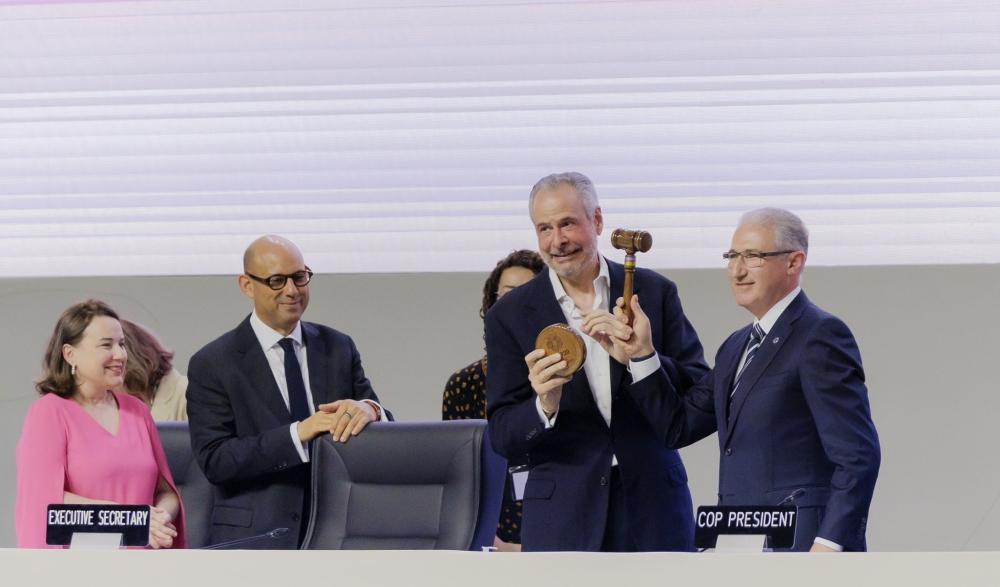Africa-Press – Rwanda. World leaders, negotiators, and climate experts from across the world have gathered in Belém, Brazil, from 10 to 21 November, for COP30, this year’s Conference of the Parties under the United Nations Framework Convention on Climate Change.
At the summit, Rwanda is expected to participate in climate negotiations, present its initiatives, and engage with potential investors. Officials will use COP30 to showcase the country’s climate actions, attract green investment, and secure support for climate projects.
COP is an international climate meeting held each year by the United Nations, and it brings together all member states that have signed the United Nations Framework Convention on Climate Change (UNFCC) to review progress, adopt new measures, and make main decisions to ensure the Convention is effectively implemented
The 29th COP summit took place in Baku, Azerbaijan.
The first COP meeting was held in Berlin, Germany, in March 1995. One of the COP’s main roles is to review national reports and emission data from member countries, using this information to assess progress toward the convention’s overall goals. Currently, 198 countries participate in COP meetings.
“The Conference of Parties (COP) is the premier multilateral forum for global cooperation on addressing the climate crisis,” said Mohamed Adow, Founder and Director of Power Shift Africa, a Nairobi-based climate and energy think tank.
“Climate change is a global challenge with sometimes irreversible impacts on lives, livelihoods, and economies. By meeting annually, nations have an opportunity to assess progress, negotiate decisions, and commit actions and resources necessary to combat the changing climate.
Bringing nations together for universal solutions
In an interview with The New Times, Adow noted that COP is the space where the world develops and agrees on how to implement international climate policy.
“It’s through this collaboration between countries that the Paris Agreement at COP21 was established. Under this agreement, the world committed to working together to battle the biggest threat to humanity and the planet,” he said.
He added that climate change is a transboundary challenge requiring collective solutions, noting that across Africa, the Caribbean, Latin America, Europe, and the Americas, people, rich and poor, have felt its impacts.
“While these effects are experienced differently across regions, with Africa bearing the heaviest toll. All countries must come to the table to address the crisis. No nation, however rich or technologically advanced, can solve this alone,” Adow argued.
He noted that this is the purpose COP serves, bringing nations together to design universal solutions and provide resources to support the resilience and adaptive capacity of communities and economies.
“It’s from COPs that we have mechanisms such as the Fund for Responding to Loss and Damage, which helps countries deal with climate-induced losses. Though insufficient, the $300 billion under the New Collective Quantified Goal (NCQG) agreed in Baku last year was a product of the COP process. Without COPs, we wouldn’t have the Paris Agreement that continues to mobilize global climate action,” Adow stated.
He added that COP resolutions inspire local action and influence the implementation of national climate policies. For example, he said, when countries adopt solutions such as clean energy, sustainable agriculture, or water efficiency, local communities benefit directly from these interventions.
Adow noted that COP is also the biggest stage for climate advocacy, giving community representatives and civil society groups a voice to demand solutions that address the needs of vulnerable populations.
“The side events and exhibitions at the conference create valuable spaces for learning and sharing. These interactions allow humanity to exchange knowledge and replicate successful solutions across different regions,” Adow said.
At the opening plenary in Belém on November 7, UN Climate Change Executive Secretary Simon Stiell said countries needed to treat climate change with a sense of urgency.
“We have so much more work to do. We must move much, much faster, both in reducing emissions and in strengthening resilience,” said Stiell.
He added that plans without finance cannot reach their full potential, noting that finance is the great accelerator.
Omar Elmawi, Convenor of the Africa Movement of Movements, said that COP30 must be the turning point, where words and promises translate into action.
Origin of UNFCC
The UNFCCC was opened for signature at the United Nations Conference on Environment and Development, also known as the Earth Summit, held in Rio de Janeiro in June 1992. It launched a global climate framework, built around five key pillars: mitigation, adaptation, finance, technology, and capacity building.
Over time, other issues have emerged as important topics in negotiations, including loss and damage, just transition, gender, Indigenous people, youth, agriculture, and oceans.
For More News And Analysis About Rwanda Follow Africa-Press






